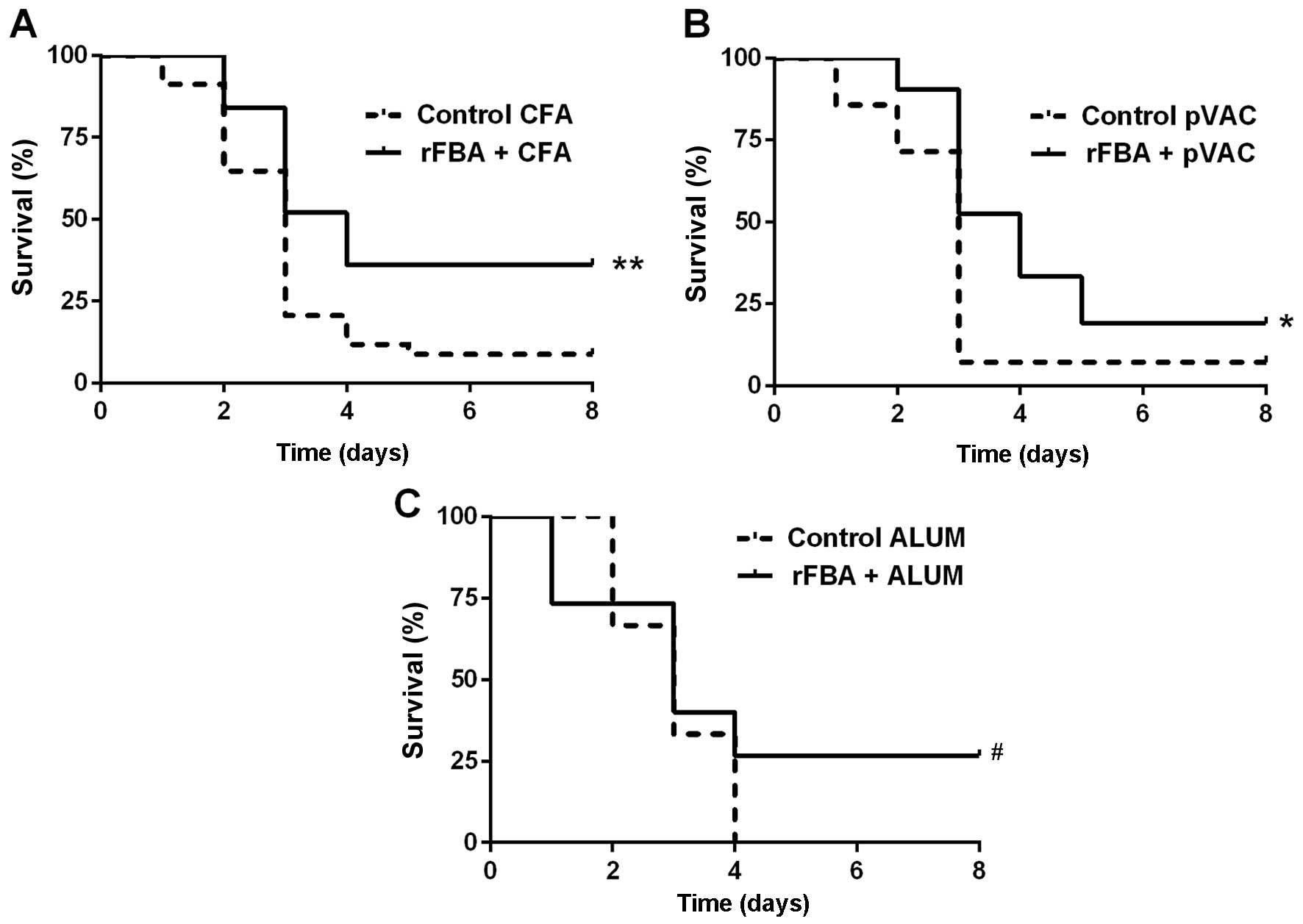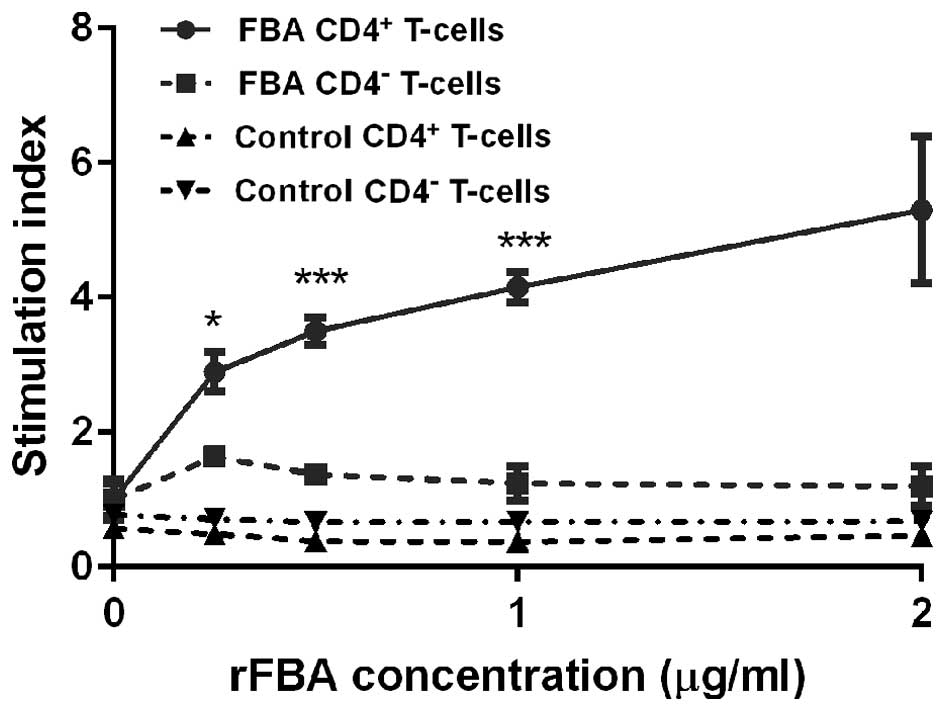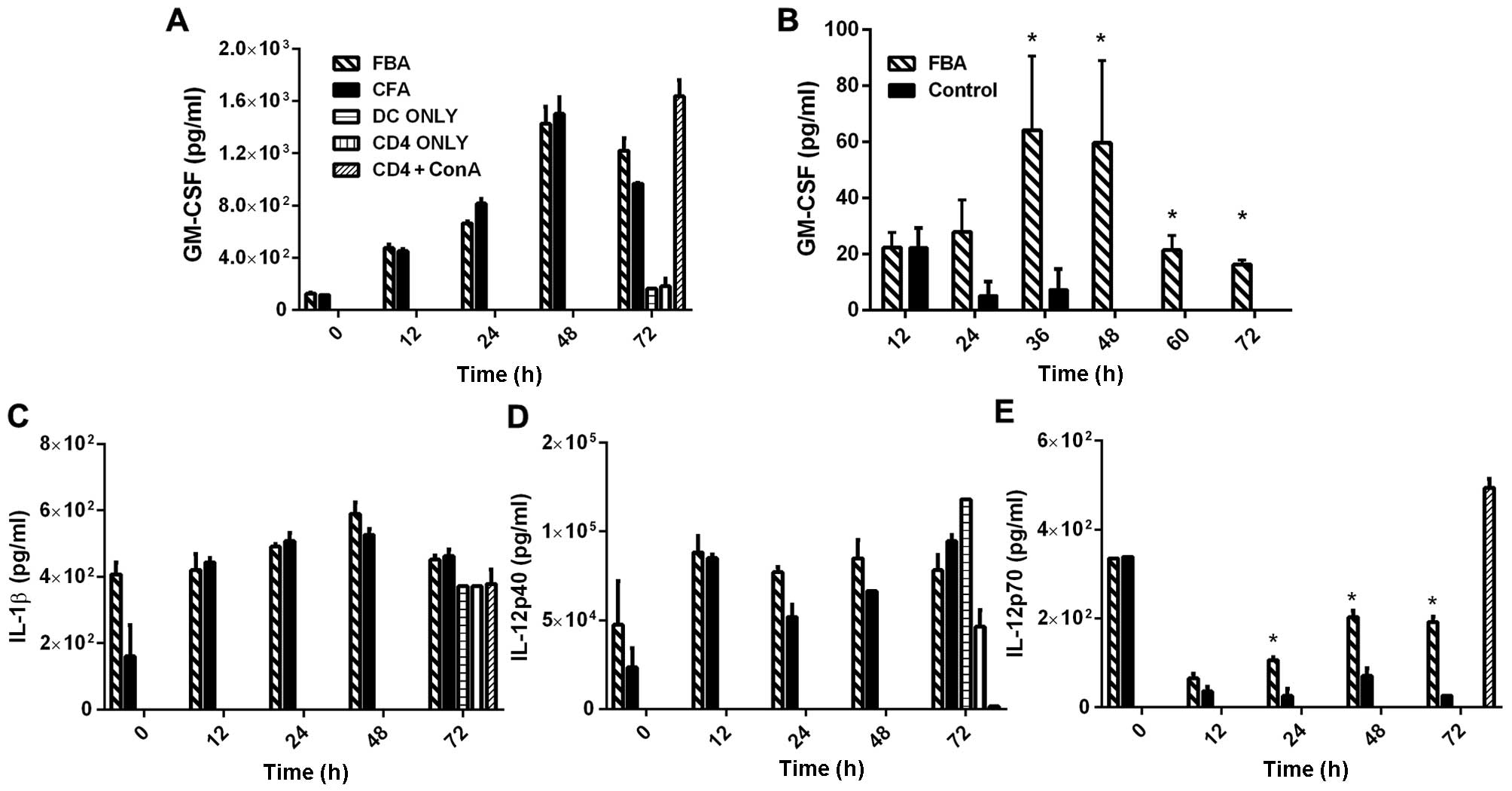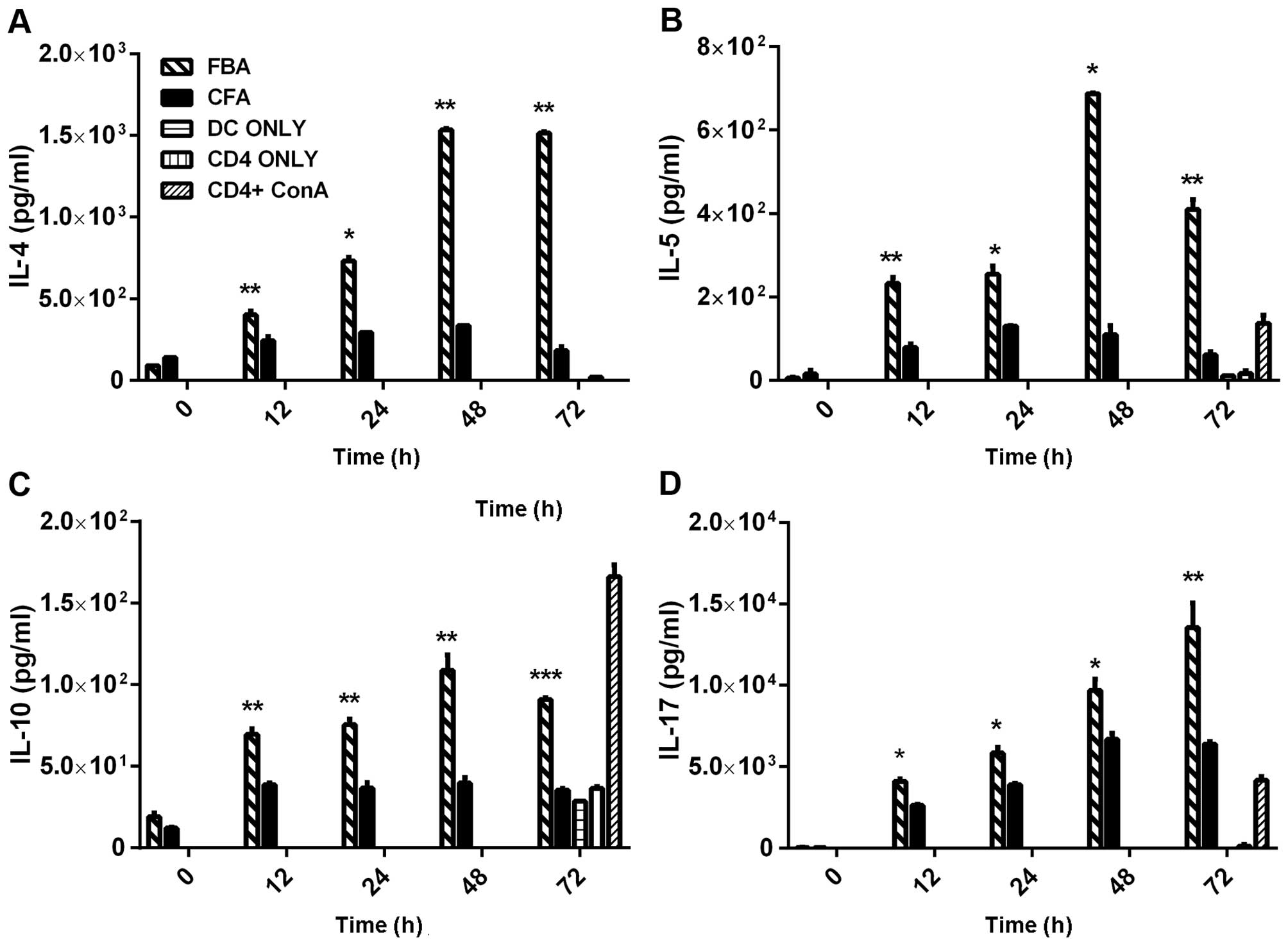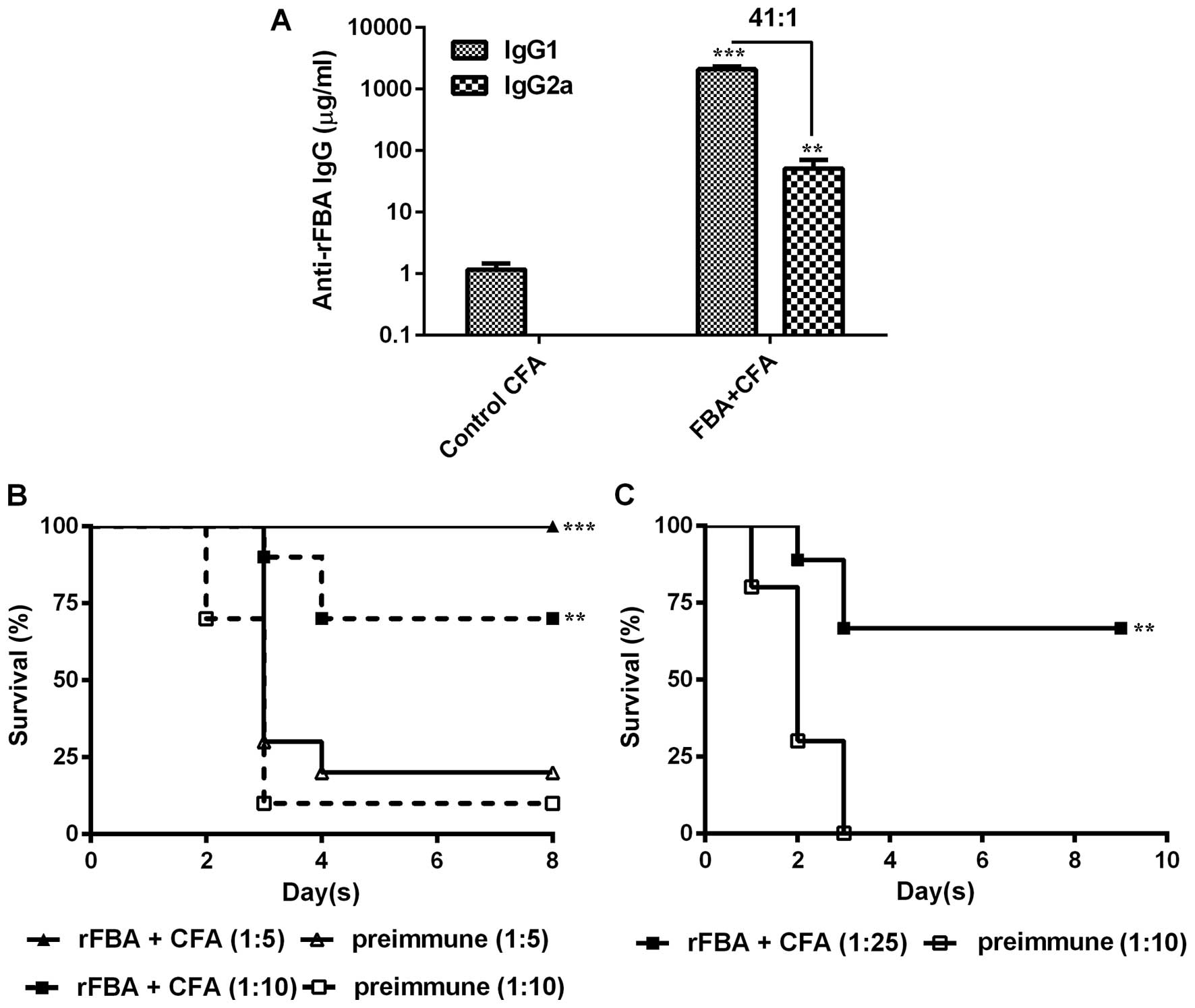|
1
|
Dagan R, Poolman J and Siegrist CA:
Glycoconjugate vaccines and immune interference: a review. Vaccine.
28:5513–5523. 2010. View Article : Google Scholar : PubMed/NCBI
|
|
2
|
van der Poll T and Opal SM: Pathogenesis,
treatment, and prevention of pneumococcal pneumonia. Lancet.
374:1543–1556. 2009. View Article : Google Scholar : PubMed/NCBI
|
|
3
|
Denoël P, Philipp MT, Doyle L, Martin D,
Carletti G and Poolman JT: A protein-based pneumococcal vaccine
protects rhesus macaques from pneumonia after experimental
infection with Streptococcus pneumoniae. Vaccine. 29:5495–5501.
2011. View Article : Google Scholar : PubMed/NCBI
|
|
4
|
Schmid P, Selak S, Keller M, Luhan B,
Magyarics Z, Seidel S, Schlick P, Reinisch C, Lingnau K, Nagy E and
Grubeck-Loebenstein B: Th17/Th1 biased immunity to the pneumococcal
proteins PcsB, StkP and PsaA in adults of different age. Vaccine.
29:3982–3989. 2011. View Article : Google Scholar : PubMed/NCBI
|
|
5
|
Koff WC, Gust ID and Plotkin SA: Toward a
human vaccines project. Nat Immunol. 15:589–592. 2014. View Article : Google Scholar : PubMed/NCBI
|
|
6
|
van Rossum AM, Lysenko ES and Weiser JN:
Host and bacterial factors contributing to the clearance of
colonization by Streptococcus pneumoniae in a murine model. Infect
Immun. 73:7718–7726. 2005. View Article : Google Scholar : PubMed/NCBI
|
|
7
|
Basset A, Thompson CM, Hollingshead SK,
Briles DE, Ades EW, Lipsitch M and Malley R: Antibody-independent,
CD4+ T-cell-dependent protection against pneumococcal
colonization elicited by intranasal immunization with purified
pneumococcal proteins. Infect Immun. 75:5460–5464. 2007. View Article : Google Scholar : PubMed/NCBI
|
|
8
|
Malley R and Anderson PW:
Serotype-independent pneumococcal experimental vaccines that induce
cellular as well as humoral immunity. Proc Natl Acad Sci USA.
109:3623–3627. 2012. View Article : Google Scholar : PubMed/NCBI
|
|
9
|
Mureithi MW, Finn A, Ota MO, Zhang Q,
Davenport V, Mitchell TJ, Williams NA, Adegbola RA and Heyderman
RS: T cell memory response to pneumococcal protein antigens in an
area of high pneumococcal carriage and disease. J Infect Dis.
200:783–793. 2009. View
Article : Google Scholar : PubMed/NCBI
|
|
10
|
Pido-Lopez J, Kwok WW, Mitchell TJ,
Heyderman RS and Williams NA: Acquisition of pneumococci specific
effector and regulatory CD4+ T cells localising within
human upper respiratory-tract mucosal lymphoid tissue. PLoS Pathog.
7:e10023962011. View Article : Google Scholar
|
|
11
|
Rosenow C, Ryan P, Weiser JN, Johnson S,
Fontan P, Ortqvist A and Masure HR: Contribution of novel
choline-binding proteins to adherence, colonization and
immunogenicity of Streptococcus pneumoniae. Mol Microbiol.
25:819–829. 1997. View Article : Google Scholar : PubMed/NCBI
|
|
12
|
Mann B, Thornton J, Heath R, Wade KR,
Tweten RK, Gao G, El Kasmi K, Jordan JB, Mitrea DM, Kriwacki R, et
al: Broadly protective protein-based pneumococcal vaccine composed
of pneumolysin toxoid-CbpA peptide recombinant fusion protein. J
Infect Dis. 209:1116–1125. 2014. View Article : Google Scholar :
|
|
13
|
Glover DT, Hollingshead SK and Briles DE:
Streptococcus pneumoniae surface protein PcpA elicits protection
against lung infection and fatal sepsis. Infect Immun.
76:2767–2776. 2008. View Article : Google Scholar : PubMed/NCBI
|
|
14
|
Talkington DF, Brown BG, Tharpe JA, Koenig
A and Russell H: Protection of mice against fatal pneumococcal
challenge by immunization with pneumococcal surface adhesin A
(PsaA). Microb Pathog. 21:17–22. 1996. View Article : Google Scholar : PubMed/NCBI
|
|
15
|
Rose L, Shivshankar P, Hinojosa E,
Rodriguez A, Sanchez CJ and Orihuela CJ: Antibodies against PsrP, a
novel Streptococcus pneumoniae adhesin, block adhesion and protect
mice against pneumococcal challenge. J Infect Dis. 198:375–383.
2008. View
Article : Google Scholar : PubMed/NCBI
|
|
16
|
Daniels CC, Kim KH, Burton RL, Mirza S,
Walker M, King J, Hale Y, Coan P, Rhee DK, Nahm MH and Briles DE:
Modified opsonization, phagocytosis, and killing assays to measure
potentially protective antibodies against pneumococcal surface
protein A. Clin Vaccine Immunol. 20:1549–1558. 2013. View Article : Google Scholar : PubMed/NCBI
|
|
17
|
Giefing C, Meinke AL, Hanner M, Henics T,
Bui MD, Gelbmann D, Lundberg U, Senn BM, Schunn M, Habel A, et al:
Discovery of a novel class of highly conserved vaccine antigens
using genomic scale antigenic fingerprinting of pneumococcus with
human antibodies. J Exp Med. 205:117–131. 2008. View Article : Google Scholar : PubMed/NCBI
|
|
18
|
Pancholi V and Chhatwal GS: Housekeeping
enzymes as virulence factors for pathogens. Int J Med Microbiol.
293:391–401. 2003. View Article : Google Scholar
|
|
19
|
Tunio SA, Oldfield NJ, Berry A, Ala'Aldeen
DA, Wooldridge KG and Turner DP: The moonlighting protein
fructose-1,6-bisphosphate aldolase of Neisseria meningitidis:
surface localization and role in host cell adhesion. Mol Microbiol.
76:605–615. 2010. View Article : Google Scholar : PubMed/NCBI
|
|
20
|
Wu Z, Zhang W and Lu C: Immunoproteomic
assay of surface proteins of Streptococcus suis serotype 9. FEMS
Immunol Med Microbiol. 53:52–59. 2008. View Article : Google Scholar : PubMed/NCBI
|
|
21
|
McCarthy JS, Wieseman M, Tropea J, Kaslow
D, Abraham D, Lustigman S, Tuan R, Guderian RH and Nutman TB:
Onchocerca volvulus glycolytic enzyme fructose-1,6-bisphosphate
aldolase as a target for a protective immune response in humans.
Infect Immun. 70:851–858. 2002. View Article : Google Scholar : PubMed/NCBI
|
|
22
|
Ling E, Feldman G, Portnoi M, Dagan R,
Overweg K, Mulholland F, Chalifa-Caspi V, Wells J and
Mizrachi-Nebenzahl Y: Glycolytic enzymes associated with the cell
surface of Streptococcus pneumoniae are antigenic in humans and
elicit protective immune responses in the mouse. Clin Exp Immunol.
138:290–298. 2004. View Article : Google Scholar : PubMed/NCBI
|
|
23
|
Portnoi M, Ling E, Feldman G, Dagan R and
Mizrachi-Nebenzahl Y: The vaccine potential of Streptococcus
pneumoniae surface lectin- and non-lectin proteins. Vaccine.
24:1868–1873. 2006. View Article : Google Scholar
|
|
24
|
Blau K, Portnoi M, Shagan M, Kaganovich A,
Rom S, Kafka D, Chalifa Caspi V, Porgador A, Givon-Lavi N, Gershoni
JM, et al: Flamingo cadherin: a putative host receptor for
Streptococcus pneumoniae. J Infect Dis. 195:1828–1837. 2007.
View Article : Google Scholar : PubMed/NCBI
|
|
25
|
Mori A, Oleszycka E, Sharp FA, Coleman M,
Ozasa Y, Singh M, O'Hagan DT, Tajber L, Corrigan OI, McNeela EA and
Lavelle EC: The vaccine adjuvant alum inhibits IL-12 by promoting
PI3 kinase signaling while chitosan does not inhibit IL-12 and
enhances Th1 and Th17 responses. Eur J Immunol. 42:2709–2719. 2012.
View Article : Google Scholar : PubMed/NCBI
|
|
26
|
Chhatwal GS: Anchorless adhesins and
invasins of Gram-positive bacteria: a new class of virulence
factors. Trends Microbiol. 10:205–208. 2002. View Article : Google Scholar : PubMed/NCBI
|
|
27
|
Henderson B and Martin A: Bacterial
virulence in the moonlight: multitasking bacterial moonlighting
proteins are virulence determinants in infectious disease. Infect
Immun. 79:3476–3491. 2011. View Article : Google Scholar : PubMed/NCBI
|
|
28
|
Garçon N and Van Mechelen M: Recent
clinical experience with vaccines using MPL- and QS-21-containing
adjuvant systems. Expert Rev Vaccines. 10:471–486. 2011. View Article : Google Scholar : PubMed/NCBI
|
|
29
|
Moon JJ, Huang B and Irvine DJ:
Engineering nano- and microparticles to tune immunity. Adv Mater.
24:3724–3746. 2012. View Article : Google Scholar : PubMed/NCBI
|
|
30
|
Keler T, He L, Ramakrishna V and Champion
B: Antibody-targeted vaccines. Oncogene. 26:3758–3767. 2007.
View Article : Google Scholar : PubMed/NCBI
|
|
31
|
Liu H, Moynihan KD, Zheng Y, Szeto GL, Li
AV, Huang B, Van Egeren DS, Park C and Irvine DJ: Structure-based
programming of lymph-node targeting in molecular vaccines. Nature.
507:519–522. 2014. View Article : Google Scholar : PubMed/NCBI
|
|
32
|
Libbey JE and Fujinami RS: Experimental
autoimmune encephalomyelitis as a testing paradigm for adjuvants
and vaccines. Vaccine. 29:3356–3362. 2011. View Article : Google Scholar :
|
|
33
|
Delany I, Rappuoli R and De Gregorio E:
Vaccines for the 21st century. EMBO Mol Med. 6:708–720.
2014.PubMed/NCBI
|
|
34
|
Seiberling M, Bologa M, Brookes R, Ochs M,
Go K, Neveu D, Kamtchoua T, Lashley P, Yuan T and Gurunathan S:
Safety and immunogenicity of a pneumococcal histidine triad protein
D vaccine candidate in adults. Vaccine. 30:7455–7460. 2012.
View Article : Google Scholar : PubMed/NCBI
|
|
35
|
Adamou JE, Heinrichs JH, Erwin AL, Walsh
W, Gayle T, Dormitzer M, Dagan R, Brewah YA, Barren P, Lathigra R,
et al: Identification and characterization of a novel family of
pneumococcal proteins that are protective against sepsis. Infect
Immun. 69:949–958. 2001. View Article : Google Scholar : PubMed/NCBI
|
|
36
|
Wizemann TM, Heinrichs JH, Adamou JE,
Erwin AL, Kunsch C, Choi GH, Barash SC, Rosen CA, Masure HR,
Tuomanen E, et al: Use of a whole genome approach to identify
vaccine molecules affording protection against Streptococcus
pneumoniae infection. Infect Immun. 69:1593–1598. 2001. View Article : Google Scholar : PubMed/NCBI
|
|
37
|
Lu YJ, Yadav P, Clements JD, Forte S,
Srivastava A, Thompson CM, Seid R, Look J, Alderson M, Tate A, et
al: Options for inactivation, adjuvant, and route of topical
administration of a killed, unencapsulated pneumococcal whole-cell
vaccine. Clin Vaccine Immunol. 17:1005–1012. 2010. View Article : Google Scholar : PubMed/NCBI
|
|
38
|
Lu YJ, Leite L, Gonçalves VM, Dias WO,
Liberman C, Fratelli F, Alderson M, Tate A, Maisonneuve JF,
Robertson G, et al: GMP-grade pneumococcal whole-cell vaccine
injected subcutaneously protects mice from nasopharyngeal
colonization and fatal aspiration-sepsis. Vaccine. 28:7468–7475.
2010. View Article : Google Scholar : PubMed/NCBI
|
|
39
|
Malley R, Srivastava A, Lipsitch M,
Thompson CM, Watkins C, Tzianabos A and Anderson PW:
Antibody-independent, interleukin-17A-mediated, cross-serotype
immunity to pneumococci in mice immunized intranasally with the
cell wall polysaccharide. Infect Immun. 74:2187–2195. 2006.
View Article : Google Scholar : PubMed/NCBI
|
|
40
|
Kumar S, Ingle H, Prasad DV and Kumar H:
Recognition of bacterial infection by innate immune sensors. Crit
Rev Microbiol. 39:229–246. 2013. View Article : Google Scholar
|
|
41
|
Moffitt K, Skoberne M, Howard A,
Gavrilescu LC, Gierahn T, Munzer S, Dixit B, Giannasca P, Flechtner
JB and Malley R: Toll-like receptor 2-dependent protection against
pneumococcal carriage by immunization with lipidated pneumococcal
proteins. Infect Immun. 82:2079–2086. 2014. View Article : Google Scholar : PubMed/NCBI
|
|
42
|
Liu X, Wetzler LM and Massari P: The PorB
porin from commensal Neisseria lactamica induces Th1 and Th2 immune
responses to ovalbumin in mice and is a potential immune adjuvant.
Vaccine. 26:786–796. 2008. View Article : Google Scholar : PubMed/NCBI
|
|
43
|
Zhang Q, Bagrade L, Bernatoniene J, Clarke
E, Paton JC, Mitchell TJ, Nunez DA and Finn A: Low CD4 T cell
immunity to pneumolysin is associated with nasopharyngeal carriage
of pneumococci in children. J Infect Dis. 195:1194–1202. 2007.
View Article : Google Scholar : PubMed/NCBI
|
|
44
|
Mosmann TR and Coffman RL: TH1 and TH2
cells: Different patterns of lymphokine secretion lead to different
functional properties. Annu Rev Immunol. 7:145–173. 1989.
View Article : Google Scholar : PubMed/NCBI
|
|
45
|
Harrington LE, Mangan PR and Weaver CT:
Expanding the effector CD4 T-cell repertoire: the Th17 lineage.
Curr Opin Immunol. 18:349–356. 2006. View Article : Google Scholar : PubMed/NCBI
|
|
46
|
Villarino AV, Tato CM, Stumhofer JS, Yao
Z, Cui YK, Hennighausen L, O'Shea JJ and Hunter CA: Helper T cell
IL-2 production is limited by negative feedback and STAT-dependent
cytokine signals. J Exp Med. 204:65–71. 2007. View Article : Google Scholar : PubMed/NCBI
|
|
47
|
van den Biggelaar AH, Pomat WS,
Phuanukoonnon S, Michael A, Aho C, Nadal-Sims MA, Devitt CJ, Jacoby
PA, Hales BJ, Smith WA, et al: Effect of early carriage of
Streptococcus pneumoniae on the development of pneumococcal
protein-specific cellular immune responses in infancy. Pediatr
Infect Dis J. 31:243–248. 2012. View Article : Google Scholar
|
|
48
|
Ferreira DM, Darrieux M, Silva DA, Leite
LC, Ferreira JM Jr, Ho PL, Miyaji EN and Oliveira ML:
Characterization of protective mucosal and systemic immune
responses elicited by pneumococcal surface protein PspA and PspC
nasal vaccines against a respiratory pneumococcal challenge in
mice. Clin Vaccine Immunol. 16:636–645. 2009. View Article : Google Scholar : PubMed/NCBI
|
|
49
|
Khan AQ, Shen Y, Wu ZQ, Wynn TA and
Snapper CM: Endogenous pro- and anti-inflammatory cytokines
differentially regulate an in vivo humoral response to
Streptococcus pneumoniae. Infect Immun. 70:749–761. 2002.
View Article : Google Scholar : PubMed/NCBI
|
|
50
|
Wei WC, Su YH, Chen SS, Sheu JH and Yang
NS: GM-CSF plays a key role in zymosan-stimulated human dendritic
cells for activation of Th1 and Th17 cells. Cytokine. 55:79–89.
2011. View Article : Google Scholar : PubMed/NCBI
|
|
51
|
Tourret M, Guégan S, Chemin K, Dogniaux S,
Miro F, Bohineust A and Hivroz C: T cell polarity at the
immunological synapse is required for CD154-dependent IL-12
secretion by dendritic cells. J Immunol. 185:6809–6818. 2010.
View Article : Google Scholar : PubMed/NCBI
|
|
52
|
Cao J, Zhang X, Gong Y, Zhang Y, Cui Y,
Lai X, Yin Y, Li M, Li D and Zhang L: Protection against
pneumococcal infection elicited by immunization with multiple
pneumococcal heat shock proteins. Vaccine. 31:3564–3571. 2013.
View Article : Google Scholar : PubMed/NCBI
|
|
53
|
Li Y, Wang S, Scarpellini G, Gunn B, Xin
W, Wanda SY, Roland KL and Curtiss R III: Evaluation of new
generation Salmonella enterica serovar Typhimurium vaccines with
regulated delayed attenuation to induce immune responses against
PspA. Proc Natl Acad Sci USA. 106:593–598. 2009. View Article : Google Scholar :
|
|
54
|
Miyaji EN, Dias WO, Gamberini M, Gebara
VC, Schenkman RP, Wild J, Riedl P, Reimann J, Schirmbeck R and
Leite LC: PsaA (pneumococcal surface adhesin A) and PspA
(pneumococcal surface protein A) DNA vaccines induce humoral and
cellular immune responses against Streptococcus pneumoniae.
Vaccine. 20:805–812. 2001. View Article : Google Scholar : PubMed/NCBI
|
|
55
|
Peñaloza HF, Nieto PA, Muñoz-Durango N,
Salazar-Echegarai FJ, Torres J, Parga MJ, Alvarez-Lobos M, Riedel
CA, Kalergis AM and Bueno SM: Interleukin-10 plays a key role in
the modulation of neutrophils recruitment and lung inflammation
during infection by Streptococcus pneumoniae. Immunology.
146:100–112. 2015. View Article : Google Scholar : PubMed/NCBI
|
|
56
|
Vintiñi E, Villena J, Alvarez S and Medina
M: Administration of a probiotic associated with nasal vaccination
with inactivated Lactococcus lactis-PppA induces effective
protection against pneumoccocal infection in young mice. Clin Exp
Immunol. 159:351–362. 2010. View Article : Google Scholar :
|
|
57
|
Wu K, Yao R, Wang H, Pang D, Liu Y, Xu H,
Zhang S, Zhang X and Yin Y: Mucosal and systemic immunization with
a novel attenuated pneumococcal vaccine candidate confer serotype
independent protection against Streptococcus pneumoniae in mice.
Vaccine. 32:4179–4188. 2014. View Article : Google Scholar : PubMed/NCBI
|
|
58
|
Narita K, Hu DL, Mori F, Wakabayashi K,
Iwakura Y and Nakane A: Role of interleukin-17A in cell-mediated
protection against Staphylococcus aureus infection in mice
immunized with the fibrinogen-binding domain of clumping factor A.
Infect Immun. 78:4234–4242. 2010. View Article : Google Scholar : PubMed/NCBI
|
|
59
|
Poretz RD and Goldstein IJ:
Protein-carbohydrate interaction. On the mode of bonding of
aromatic moieties to concanavalin A, the phytohemagglutinin of the
jack bean. Biochem Pharmacol. 20:2727–2739. 1971. View Article : Google Scholar : PubMed/NCBI
|
|
60
|
Chilson OP and Kelly-Chilson AE: Mitogenic
lectins bind to the antigen receptor on human lymphocytes. Eur J
Immunol. 19:389–396. 1989. View Article : Google Scholar : PubMed/NCBI
|
|
61
|
Fleischer B: Activation of human T
lymphocytes II. Involvement of the T3 antigen in polyclonal T cell
activation by mitogenic lectins and oxidation. Eur J Immunol.
14:748–752. 1984. View Article : Google Scholar : PubMed/NCBI
|
|
62
|
Weiss A, Imboden J, Hardy K, Manger B,
Terhorst C and Stobo J: The role of the T3/antigen receptor complex
in T-cell activation. Annu Rev Immunol. 4:593–619. 1986. View Article : Google Scholar : PubMed/NCBI
|
|
63
|
Pani G, Colavitti R, Borrello S and
Galeotti T: Endogenous oxygen radicals modulate protein tyrosine
phosphorylation and JNK-1 activation in lectin-stimulated
thymocytes. Biochem J. 347:173–181. 2000. View Article : Google Scholar : PubMed/NCBI
|
|
64
|
Callahan TA and Moynihan JA: Contrasting
pattern of cytokines in antigen-versus mitogen-stimulated
splenocyte cultures from chemically denervated mice. Brain Behav
Immun. 16:764–773. 2002. View Article : Google Scholar : PubMed/NCBI
|
|
65
|
Vadesilho CF, Ferreira DM, Moreno AT,
Chavez-Olortegui C, Machado de Avila RA, Oliveira ML, Ho PL and
Miyaji EN: Characterization of the antibody response elicited by
immunization with pneumococcal surface protein A (PspA) as
recombinant protein or DNA vaccine and analysis of protection
against an intranasal lethal challenge with Streptococcus
pneumoniae. Microb Pathog. 53:243–249. 2012. View Article : Google Scholar : PubMed/NCBI
|
|
66
|
Hammerschmidt S, Wolff S, Hocke A, Rosseau
S, Müller E and Rohde M: Illustration of pneumococcal
polysaccharide capsule during adherence and invasion of epithelial
cells. Infect Immun. 73:4653–4667. 2005. View Article : Google Scholar : PubMed/NCBI
|
|
67
|
Khan MN, Sharma SK, Filkins LM and
Pichichero ME: PcpA of Streptococcus pneumoniae mediates adherence
to nasopharyngeal and lung epithelial cells and elicits functional
antibodies in humans. Microbes Infect. 14:1102–1110. 2012.
View Article : Google Scholar : PubMed/NCBI
|















